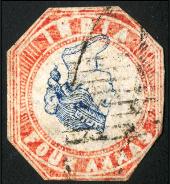 A rare 159-year-old four-anna Indian stamp, with an image of Queen Victoria's head upside down due to a printing error, is expected to fetch 70,000 pounds at an auction in London.
A rare 159-year-old four-anna Indian stamp, with an image of Queen Victoria's head upside down due to a printing error, is expected to fetch 70,000 pounds at an auction in London.
During the first printing of the four-annas stamp in the survey office in Calcutta in 1854, the Queen's head was accidentally printed upside down on the stamp.
The mistake went unnoticed and dozens of the stamps were sold in India, the Daily Mail reported.
The postage stamp is said to be one of the most sought-after items in the world of philately.
Only about 20 or 30 of the stamps remain in existence today and the one that is to be auctioned is said to be completely free of faults or blemishes.
It was in the collection of renowned US philatelist Robert Cunliffe for many years and is now being sold by another private collector.
Auctioneers Spink of London has put an estimate of between 50,000 to 70,000 pounds for the auction on January 23.
"This is an incredibly rare stamp, with about 25
known examples in the world.
"There was an accident during the printing process which meant the Queen's head was upside down," David Parsons, a stamp specialist at Spink's, said.
"Collectors of stamps love inverted stamps because they are so startling. Queen Victoria's head appeared on stamps in India right up until her death in 1901," Parsons said.
"The mistake wasn't noticed at the time because they clearly went into circulation and were bought by people," Parsons added.
The four annas stamp was one of the first multi-coloured stamps in the world at the time.
The outline was printed in red and the head of Queen Victoria was in blue and was added within the frame.
The stamps were printed in 12 to a sheet and more than 206,000 stamps were produced. It is believed the error was made on three sheets.
Image: The stamp with Victoria's head upside down | Photograph, courtesy: www.thetimes.co.uk© Copyright 2025 PTI. All rights reserved. Republication or redistribution of PTI content, including by framing or similar means, is expressly prohibited without the prior written consent.

 A rare 159-year-old four-anna Indian stamp, with an image of Queen Victoria's head upside down due to a printing error, is expected to fetch 70,000 pounds at an auction in London.
A rare 159-year-old four-anna Indian stamp, with an image of Queen Victoria's head upside down due to a printing error, is expected to fetch 70,000 pounds at an auction in London.